HOME | ABOUT US | MEDIA KIT | CONTACT US | INQUIRE
HOME | ABOUT US | MEDIA KIT | CONTACT US | INQUIRE
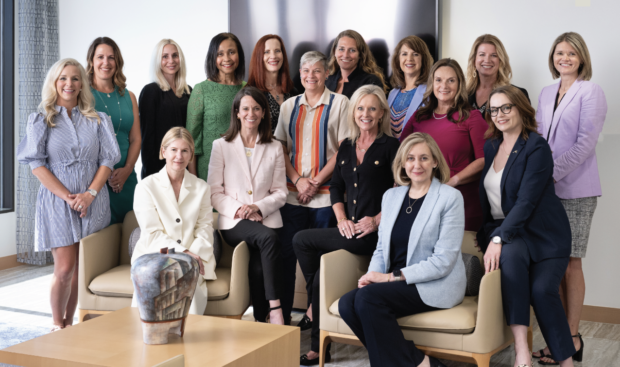
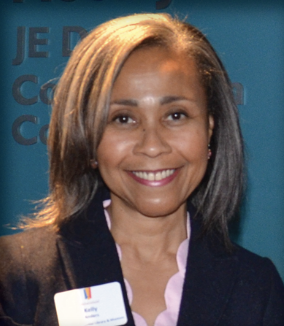 Kelly Anders, Deputy Director, Harry S. Truman Presidential Library & Museum
Kelly Anders, Deputy Director, Harry S. Truman Presidential Library & Museum
For a newly minted law school graduate, this constitutes a true epiphany: “I quickly realized something important: I don’t like to argue, which most successful lawyers do all the time,” says Kelly Anders, now deputy director of the Harry S. Truman Presidential Library & Museum in Independence. But that legal education wasn’t wasted: “Fortunately, I found my place in the law through working as a research assistant to the director of the law library” at Pepperdine University. “I discovered that I could be a lawyer and teacher without having to argue or take a side. This led to a career in legal education and law librarianship.” Her career has taken her through various fields, including newspaper reporting, radio station program hosting, law school teaching, and, most recently, into the museum track that brought her to Independence. That she’s a Midwesterner today is due in large part to the influence of one Warren Buffet, thanks to the scholarship program he funded. It required her to attend college in Nebraska, so she left her native California for Lincoln and earned a journalism degree with minors that reflected her passions for art, history, and French. Coming to this part of the country wasn’t exactly a culture clash. “My family is originally from Nebraska and Iowa, and I’m proud of my Midwestern roots,” Anders says. “My closest professional role models are in my family, especially my mother, a trailblazer who worked as a commercial lines insurance underwriter in the 1970s, and my grandfather, a Pullman Porter for nearly 30 years. My family has always valued education, a strong work ethic, good manners, and community service.” Her original vision for college was an art degree, “but my family advised me to choose something more practical. I chose journalism so that I could continue to be creative and I could write about subjects that interested me.” Anders put that to use at the Omaha newspaper and the overnight shift at KEZO “Z-92,” a classic rock station. From Pepperdine, she came back to the Midwest as Dean of Students at Washburn University, where she also taught an art law course. A master’s degree in library science at Mizzou led to nearly five years at the helm of the Jackson County Law Library, then came the Truman post. “Since there are only 15 presidential libraries managed by the National Archives and Records Administration, openings for deputy directors are rare,” she notes. She’s also highly service-minded, with the Nelson-Atkins Museum of Art’s Society of Fellows board and Committee of 100, advisory-board roles for KCUR and the metro bar association, and the Independence chamber. To young executives seeking leadership tracks, she counsels, “it’s important to remember that career paths are seldom linear; there can be turns and detours along the way that may seem like you’re not moving forward when you are. The most important thing is to be consistent with your quality of work, which contributes to your reputation, which builds regardless of your title.”
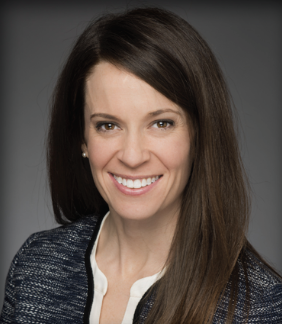 Rachel Arnett, VP of Sales, Blue Cross and Blue Shield of Kansas City
Rachel Arnett, VP of Sales, Blue Cross and Blue Shield of Kansas City
That old nugget about taking a village to raise a child? Rachel Arnett is here to tell you there’s definitely something to it. “For as long as I can remember, I was surrounded by a village of role models that modeled a strong work ethic, inspired me to have the courage to try new things, and showed me that genuine relationships are important personally and professionally,” says Arnett, who grew up in Kansas City. “This village was unique: It included my father, a professional and collegiate coach; my mother, an art teacher turned entrepreneur running her own business; my grandmother, an elementary school teacher raising 8 children; my mom’s six sisters, all delicately and successfully managing careers and home life, and a long list of teachers, coaches, and the parents of the families I babysat for.” With a support team that was deep and talented—and with a newfound confidence she discovered at St. Teresa’s Academy—Arnett was primed for the next stage of life as a college athlete—she played soccer while earning her degree in psychology from Rockhurst University—then as a coach herself. “At the time, I didn’t realize the unique experience this would be as I transitioned from player to coach when I would be coaching my former teammates/peers,” she says. “This type of transition can be challenging in leadership, but the opportunity gave me experience and confidence when I moved into leading former peers when I was new to leadership at Blue KC.” Arnett says she was drawn to that line of work and the company “because I liked the idea of building relationships with brokers and customers to navigate insurance plans offered to employees. Blue KC had great brand recognition, and I felt an immediate connection with the mission and commitment to the KC community.” As she moved up the ranks and assumed her first leadership role, she got some advice from The Village. “I will never forget my Dad saying, ‘Congrats, just remember managing people is just like coaching a team.’” He was right, and the skills I continue to focus on today are the skills that align with coaching a team. The skills that have been critical are the ability to communicate transparently and effectively, identify and develop talent, and recognize team members for their resilience and commitment to members, customers, and brokers that we serve and partner with every day.” There’s a special place, though, for mastering what she calls leading with gratitude. “I inherently understand that success of the sales division at Blue KC is only attainable due to the efforts of the sales team and across the enterprise,” she says. “It is important to me to recognize others and positively contribute to a culture that boosts employee engagement and productivity so that employees want to be a part of Blue KC.” One of the best pieces of advice she received early in her career, she says, “was to identify people internally and externally who I felt modeled behaviors that drove success in their roles to serve as formal and informal mentors.”
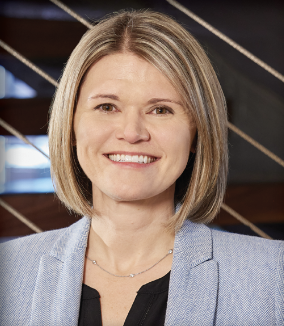 Michelle Chavey, President, Hollis+Miller Architects
Michelle Chavey, President, Hollis+Miller Architects
She grew up on a Kansas dairy farm, so Michelle Chavey knows what it means to work hard—and to get your hands dirty in the process. The first in her family to go to college, Chavey has wielded the demanding experience of farming and the example of family to follow a vision that came to her early: “I decided to be an architect in the eighth grade,” she says. The most recent step in that journey came last August when she was named the president of Hollis+Miller, the first in the nearly 75-year history of the Kansas City firm. Her approach to work runs in a straight line to her father, whom she calls “the hardest-working person I know. He instilled in me that you can fix that thing yourself. Before the Internet, you couldn’t Google how to fix a dryer; you had to go to the library.” That message—don’t wait for a hand-out from anyone to drive you along—has been her mantra since joining the firm, the only employer she’s ever known. But architecture isn’t her only skill set. She also holds a doctorate in education, a degree she picked up with strategic intent to inform her career. “I did the typical path of architect, client leader, leading a team of designers with clients on educational projects,” Chavey says. “I was an OK designer; I liked parts and pieces of it, but it was never outstanding. I realized what I loved was the connection with educators; my favorite part was hearing about how projects we created impacted them in the classroom. It was an opportunity for a growth area, with 100 percent of our focus as a firm, and we didn’t have anyone carrying that education flag from an expertise standpoint.” As for her own leadership style, Chavey says, “I genuinely believe the best version of leadership I can provide is creating an environment where I have so many smart people around me—frankly, way smarter in lot of areas—and the best I can do for them is create environment where they have enough support and guidance to feel just comfortable enough to be uncomfortable, to be pushed.” Anyone aspiring to leadership in business, she advises, shouldn’t think that “it’s just put the work in and it’ll show up. You have to be innately curious about what it means to be a leader.” At H+M, she says, no one makes associate based on tenure—advancement is merit-based. “The best way you can grow into a leadership role is to work with the mindset of, if everyone else around you looks awesome, if your project is killing it, if people around you are growing, instead of being threatened by that, you will rise in leadership because you’re focused on those people, rather than on yourself.” And for young women in particular, the design disciplines offer a wide-open pathway to success. “My view is, don’t even let the fact that you’re a woman be a layer in this,” Chavey says. “Be the right person for the role.”
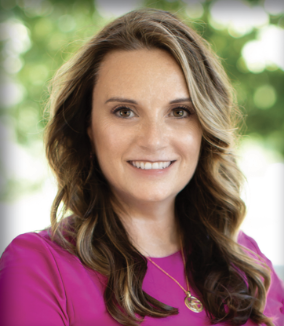 Karen Crnkovich, Owner, DMC Service
Karen Crnkovich, Owner, DMC Service
Leading a construction services company in a male-dominated world, says Karen Crnkovich, means you need allies. “But there’s a definite balance between being open and being tough,” says the owner of HVAC plumbing contractor DMC Service. “You’ve got, in my experience, to be open to listening to other ideas, open to understanding that if you’re the only woman in the room, you don’t have to come across as having a chip on your shoulder. You don’t have to prove you deserve to be there; just be there.” That leadership style—and the confidence underpinning it—has been part and parcel of DMC’s success, more than doubling in revenues since 2020 and qualifying as one of the region’s fastest-growing companies. Crnkovich finds herself in a good place, albeit one considerably different from the career she’d envisioned coming out of Mizzou with a degree focused on the hospitality sector. Her former husband founded the company she owns today (she assumed majority ownership before buying the rest outright in 2015) and set about sharpening its mission and focus. “The first thing to know is that DMC is not a construction company; we’re a service company—we’re fixers, not builders,” Crnkovich says. “That’s an important distinction because we work primarily in commercial spaces. When construction goes down, it rides a roller coaster, but with services, it’s very steady in terms of business.” Task No. 1: Building the company culture she wanted. “It was really important that we had a vision and mission that employees could get behind,” she says. From that initial group of four—she was one of them, albeit unpaid at the time—the staff has grown to 22. Creating jobs, she says, is an incredible feeling, “and it’s something I take seriously. It’s not always sunshine and rainbows, and there have been some really difficult times. But when we had those, the No. 1 concern I had was, ‘I can’t let my employees down.’ Because I wouldn’t be just letting them down; I’d be letting their families down. I take that, to this day, very, very seriously.” A Michigan native who spent most of her youth in the St. Louis area, Crnkovich self-identifies as “a naturally energetic person. Business can be stressful, but everything in life is cyclical. I learned a while ago that you don’t naturally have energy; it’s your job as a leader to generate energy. When I have those moments where I’m feeling fatigued or not motivated, I always look at the reason I’m trying to do this and whether that reason is stronger than the fatigue. A lot of times, people get it backward and spend energy just to be there. That’s not how it works. If you wait for motivation, you’ll be waiting your whole life.”
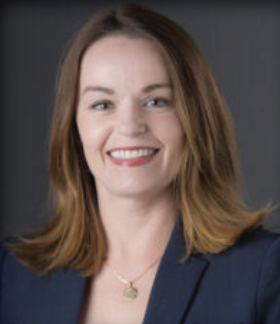 Amanda Davis, President, UMKC Foundation
Amanda Davis, President, UMKC Foundation
Look to Amanda Davis for evidence that the past is always with you—at least when you consider value sets. Her father worked for farm-implement maker John Deere; her mother was an educator. And both infused within her a sophisticated view on the value of service. “They taught me from an early age that we all serve a purpose and that while it can be really big or really small, not serving is not an option,” says Davis. “Wherever you land in life, your duty is to figure the best that you can do to serve.” Lo and behold, she does that very thing as president and chief advancement officer for the UMKC Foundation, where revenues have exploded during her two years there, up 465 percent year-over-year in 2023. That nearly five-fold increase allows the foundation to pursue its mission of promoting academic achievement, fostering research and elevating intellectual pursuits at the city’s biggest university. Hailing from tiny Garden City in Cass County, Davis earned dual degrees in English and sociology at Mizzou, returning later in her career to nab a master’s in public administration from UMKC. She’s worked in various non-profits during her career, including an earlier brief stint at UMKC, and a high point was with the American Red Cross in New Orleans during the Hurricane Katrina disaster. After a long stretch in Oklahoma, she came back to her roots two years ago along with her husband so their daughter could attend high school here. “I felt like it was meant to be,” she says, given that she found the on-line job listing just hours before the application deadline. “Knowing this place at that moment, I felt it was time to take all the things I was fortunate enough to learn and bring them back home.” Her leadership style, Davis says, contains echoes of her upbringing. “At UMKC, we think about big problems as institutions, however we move forward in the world of higher education, which is incredibly complex, and how philanthropy contributes in moving the institution forward,” she says. “At the ground level, we need to think about the detail of the work to show donors and alumni they are appreciated, welcome and needed. We need to be focused on the big picture, and on good strategies, but at the same time, be able to take the classroom view and what our contributions are, and put in a system and the details in place to allow students to do all they’re capable of doing.” The role that chance has played in her path recalls a favorite joke about how one can make God laugh: Tell him your plans. “You have to be flexible enough to recognize opportunities as they arise,” Davis says. “And to create a good base of personal, professional and educational experiences to be prepared to handle whatever the world throws at us.”
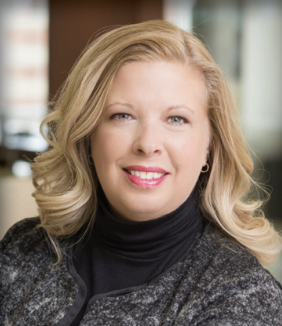 Leslie Greathouse, General Counsel, Spencer Fane
Leslie Greathouse, General Counsel, Spencer Fane
She still remembers being sworn in as a lawyer, but not entirely for the reasons you might expect from a milestone career achievement. The moment was marred, Leslie Greathouse remembers, “when the judge put his arm around me and called me sweetheart. I remember being uncomfortable, but I certainly didn’t say anything.” That, right there, is an indicator of how things have changed in both the legal profession and Greathouse’s attitude over the past three decades. “I’ve had jurors comment on my legs,” she says. “Because my name is Leslie, and it’s a name that can go either way, people would assume I was a guy.” And then there was the deposition she showed up for where the opposing counsel asked her to fetch coffee. “I made his coffee, put it in front of him, and sat down at the table. He nearly choked on that coffee, and I’m pretty sure he spent the first hour thinking about how he screwed that up.” That environment was only half the battle coming out of law school in the 1990s. The other half was the job market itself. “When I graduated, it was during one of the largest recessions in the legal market that happened in my memory; we had trouble getting jobs,” Greathouse says. “I have friends who never did practice law and went into other careers.” She started with a San Diego firm doing personal injury work, then found complex commercial contractual litigation more appealing. But she was on the vanguard of change. “It was tough,” she says, being a woman in litigation then. But her class entering law school in 1998 was part of the first nationwide in which women made up 50 percent of enrollees. “We were the first class to graduate with LA Law on every year, showing women practicing law as litigators. I certainly ran into my share of sexist behavior with opposing counsel, from inside the firm, and even from some judges, but I developed some tough skin fairly quickly.” After five years in California, family considerations prompted a move back to the Midwest. At Kutak Rock, she was tasked with putting together a financial service practice. “I loved the team I put together,” Greathouse says. “We had fun, we liked our cases, and we worked together really well. It was a really great core group we had going for a number of years.” In 2018, she moved over to Spencer Fane, where she serves as general counsel, where leadership duties have restricted her courtroom combat. It’s a sign of progress that, when she talks to young women in the profession, “they have trouble even connecting with the kind of things that we went through when we were in their shoes.”
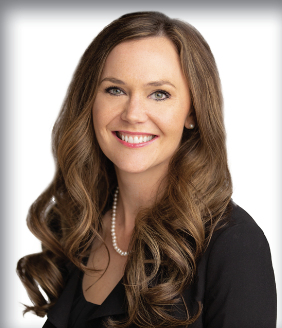 Kristen Hoffman, COO, Delta Dental of Kansas
Kristen Hoffman, COO, Delta Dental of Kansas
Many successful executives believe the best way to deal with unexpected challenges—or unexpected opportunities—is to manage with a style that heads those surprises off before they become, well, surprises. And almost all of them will tell you that doesn’t always work. So when the unexpected hits, as a leader, says Kristen Hoffman, “take notes and ask questions to make sure you understand the issue or process, think through solutions and consider the overall impact on the business; Who will be affected, who needs to be brought into the conversation. Be candid. Every day brings surprises, but be able to take those on with the appropriate team members, get consensus, and take action on the best path forward.” That’s what she brings to Delta Dental of Kansas as chief operating officer and chief experience officer. Hoffman credits her upbringing with setting her on a path for success—both of her parents were CPAs, both were business and school-oriented and her aunt and godmother, Marilyn Pauly, was the first female president of one of the largest banks in Hoffman’s hometown of Wichita. “Then I had some great teachers along the way,” she says, including a business teacher in whose class she produced a public-relations campaign that took first in state and sent her to the national competition. After earning her degree at K-State, Hoffman did direct communication correspondence for a Topeka insurance company before Delta Dental came calling. There, she says, “the work that we do truly helps people. Insurance seems boring, but it is important. I’m very service-oriented, so it feels good to provide a good experience and great results for someone we work with. And in this role, being able to work in a strategic role for the organization, how we innovate, how we improve.” Young people starting their careers may face a choice: develop competencies first and let advancement opportunities arise as they might, or set an ambitious plan to reach the leadership ranks. Either way, Hoffman says, they must “be willing to put in the work. I was able to show my abilities and prove I could be an asset to the organization. The other piece of ad-vice I’d give is to play to your strengths. I’m driven by relationships and problem-solving.” Whatever choices they make, those ambitious workers should strive for win-win situations, “I didn’t set out to be in this role,” Hoffman says, “but I’ve taken every opportunity that came to me. You never know when they will, but have the courage to take them when they do.” Hers is a sector that is highly accommodating to young women seeking careers, she says. “It’s a service everyone needs, and there are a lot of excellent companies that provide those services, whether carriers or brokers, with a lot of good entry-level positions and growth opportunities.”
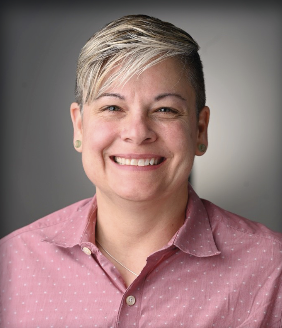 Melissa Ireland, EVP, Environmental Works
Melissa Ireland, EVP, Environmental Works
Most any veteran can tell you how life in the military infuses a certain appreciation for leadership, but for Melissa Ireland, the concept wasn’t drilled in during her own service—it was a lot more personal than that. Growing up in Chillicothe, Mo., she says, she was “surrounded by a proud family of military veterans. With grandfathers and uncles who proudly served in the Army, Air Force, Navy, and Army Air Corps and who fought in World War I, World War II, the Korean War, and the Vietnam War.” That made her decision to join the Army an easy one, and it exposed her to senior officers whose influence left a mark. While still in service, she began working on a mix of IT and military studies through Vincennes University. “At the time, this aligned with my military career goals, but I had no idea that post-military I would be working for a full-service environmental company,” let alone serving as executive vice president. Her degree path led to human resources duties with the National Guard, which “created a successful foundation for my post-military career journey,” she says. The appeal of HR leadership, she says, came from “being a voice that can make positive policy change within an organization. You have the opportunity to be a voice for those who may not have one or realize they have one.” Balancing the interests of the organization and staff drew on her affinity for integrity, empathy, accountability, and often, she says, courage. “When passionate about an issue, you must find ways to express that passion in a calm and levelheaded manner.” In 2013, somewhat drained by the intensity of military life, she looked to the private sector and thought she’d found refuge in an administrative support role at EWI. “I was ready to just have a job—go to work, do my assigned tasks, and go home. I accepted the front desk position at EWI in 2013 to fulfill that need.” It didn’t take long for the ownership to see greater potential. “I was given the opportunity or push to become a leader within the company and to take on more responsibility, which ultimately landed me in the executive vice president role in January 2019,” she says. Her own experience has taught her the value of being a well-rounded leader who understands many aspects of the organization they work for. “Starting at an entry-level position at EWI afforded me the opportunity to learn about this company from the ground up,” Ireland says. “Because of that exposure, I have a well-rounded grasp of our field operations, scientific operations, and the components that ensure we have successful financials, safety statistics, and regulatory compliance related to our administrative functions.” While environmental remediation isn’t generally thought of as a career path for most women, Ireland says, “I would absolutely encourage young women to explore careers in heavily male-dominated fields. Do not let fear of being a gender minority influence your career choices. Don’t be scared to get your hands dirty.”
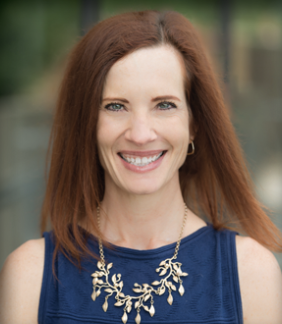 Sheri Johnson, Chief Marketing Officer, McCownGordon
Sheri Johnson, Chief Marketing Officer, McCownGordon
If you’re thinking of career advancement as a series of rungs on the ladder, Sheri Johnson is here to adjust your perspective. The chief marketing officer at McCownGordon Construction says the approach there entails a career lattice vs. the career ladder. “Sometimes, moving up means moving sideways first to gain a new skill that allows you to move up,” says Johnson. She’s the perfect example of that, having spent 18 years in a public relations/communication setting before coming on board at McCownGordon in 2018. Although she had attained senior leadership at the agency, taking that sidestep into a completely new business sector created her pathway to the C-suite at one of the region’s biggest and fastest-growing companies. But adding a little zig to your career zag is just the first move, Johnson says. “Also, it’s important to understand business, not just your particular area of expertise,” she advises. “Understand how what you’re doing ties to the business goals and bigger picture.” That she’s able to bring an entrepreneurial perspective to her duties today can be traced in part to her youth in Colorado Springs, where her father had his own veterinarian practice; from him, she learned the ebb and flow of business, along with the tenacity and hard work needed to succeed. Couple that with the organizational skills and high emotional quotient her mother demonstrated at home, and you have foundational elements of Johnson’s leadership. She headed up I-25 to the University of Denver for her bachelor’s in mass communications and psychology. Early visions of becoming a Moscow-based foreign correspondent—she even took Russian classes—gave way to the realization that it takes years to secure such a plum position. “I decided to go into corporate communications, where the opportunities for advancement were more varied,” Johnson says. “I loved my psychology classes and took a lot of them because I thought understanding more about what makes people tick could be helpful in business. After scratching an early career itch to live in California, she came to Kansas City when her husband started medical school here. Following a long run at Morningstar Communications, where she rose to senior vice president, she made the course correction to construction. “The timing was perfect,” she says. “I knew I still had a lot of energy and expertise to share. My background in marketing consulting was a huge benefit. We often counseled client CEOs, C-suite and marketing leaders, and it requires you to learn their business and industry quickly. That experience served me well in transitioning to McCownGordon. Beyond that, it was all about earning the trust of the team.” The industry, especially in the leadership ranks, continues to address its gender imbalance, albeit slowly. Because of that, Johnson says, “There’s a lot of opportunity for women…as an industry, we’re seeing more and more women rise up through operations, and we’ve had a number of women interns who pursued construction and engineering degrees join our team.”
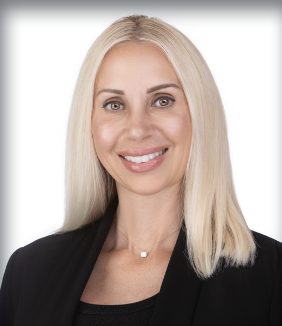 Audrey Masoner, COO, UnitedHealth Group
Audrey Masoner, COO, UnitedHealth Group
In the old westerns, you’d often see the hero’s horse shot out from under him before he’d climb back on and ride to victory. Audrey Masoner can relate: Over the course of her career, she’s seen two large Kansas City companies—one in telecom, one in financial services—end with disappointing outcomes. Undaunted, she grabbed a new set of reins in the health-care sector and now leads United Healthcare’s Community Plan of Kansas, which oversees Medicaid services for 160,000 people in the state. There, she rose to CFO before assuming duties as COO last year. Her talents do not stop at the office: She’s also the author of a children’s book, “Mayor Sly and the Magic Bow Tie,” in which the former mayor has a starring role. Masoner grew up in the Cass County hamlet of Garden City, where multiple generations of farm work, plus her father’s entrepreneurship as a grocery store owner, formed a crucible for a solid work ethic. “They believed that if you worked hard and put in the effort, you would have a path to success. Someone would always want to hire you, and you’d have a job,” she recalls. “The flipside of that was, Dad owned his own business, so he never got away from work, either.” After earning her degree in finance from Rockhurst University, she had career stops at Embarq (which was later acquired and relocated its headquarters to Louisiana) and DST Systems, another acquisition target. “I always found myself very adaptable, willing to learn and be where I needed to be in order make things happen,” Masoner says. “Most kids my age who went with Embarq would have stayed at Sprint, but they saw it as a once-in-a-lifetime opportunity, and we got to be part of the swat team. I knew what I was getting into,” she says, “but it was my first exposure to watching an executive team that chose not to lead.” There was a lesson in that experience. “Some people,” Masoner says, “place too much reliance on their employer and the organization charting a path. But no path is guaranteed.” She has taken her own advice to refrain from being caught in the gravity of an organization, to take ownership, to do the net-working, and to figure out what to do next. For three years between telecom and DST, she worked at Blue Cross and Blue Shield of Kansas City, and the leadership at United made the move a no-brainer, she says, when it needed a CFO in 2018. “I knew nothing about Medicaid, programmatically, so I had to do a lot of reading,” she says. “But I knew if I could work with these guys that it would be awesome.” Career success, she says, “can be as much about who you get to work with as anything. I knew it would be a great job.”
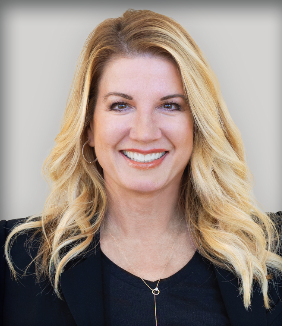 Melea McRae, CEO/Founder, Crux KC
Melea McRae, CEO/Founder, Crux KC
Deadlines and client demands can make the world of marketing a grueling place. Just ask Melea McRae, who envisioned a better kind of workplace, then went out and built it. “I am a single mom of a 17-year-old, and it wasn’t all that long ago that I worked for male employers who didn’t allow for flexibility in the schedule to go and wear the mom hat as needed for those early dismissals and school performances. The concept of remote work was not accepted.” So when she launched Crux in 2016, she says, “I did so with the promise that my employees could be parents and employees and balance both. I offered that flexibility from Day One.” Then, another event came along that would test her flexibility as a leader: a global pandemic. “Since COVID, the world has opened its eyes to the benefits of flex time and remote work, and I’m really grateful to be able to continue to offer that and support the young working moms (and dads) at Crux,” she says. “I’m glad that my employees don’t have to experience the guilt and frustration and balancing act and all the favors I had to call in, that I had to when my daughter was in the elementary and middle school days when we, as parents, are really at the mercy of the school schedule. Many positive changes in work culture came as a result of COVID that will hopefully continue to champion women in the workforce and their rise into more leadership positions.” A Nebraska native, she saw entrepreneurship up close through her father’s pharmacy and, after his death, on her stepfather’s farm. “Growing up on a farm brought me a tremendous amount of grit and determination, the value of hard work, your word is your bond, the value of a dollar. All the good life lessons,” McRae says. Entrepreneurship also showed up at Halloween when she was 10 years old. “I dressed up as an entrepreneur carrying my hard-sided briefcase filled with paper products,” she says. “So, I think I always had that itch to be in charge of my own career destiny.” She started scratching that itch when, while still in her 20s, she reached the first leadership run on her marketing career ladder. Managing people for the first time, she says, “my eyes were opened to the need to further develop my leadership skills. I tried to emulate qualities that I admired in leaders I had worked for. I wanted to consume as much knowledge as I could on being a strong and effective leader.” She founded Crux with “the belief that there had to be a better way to service small to mid-size businesses with a marketing solution led by strategy, followed by execution,” she says, and drew heavily on her own network of contacts to supplement her confidence and abilities. “That being said, as a single mom with a mortgage, I was a little terrified to make the leap…until a life coach said to me, ‘OK, what’s the worst thing that will happen if you fail? You’ll go and land a new job. You’re in marketing…you’re highly marketable.’ So with that advice, I closed my eyes and jumped.”
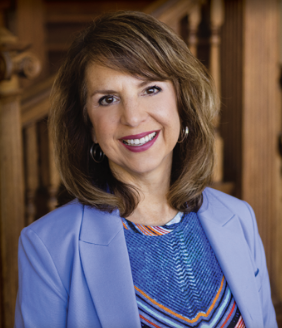 Julie Robinson, Chief Client Officer, Trozzolo Communications Group
Julie Robinson, Chief Client Officer, Trozzolo Communications Group
Julie Robinson made all the right moves to position herself as broadcast journalism’s next Barbara Walters: From reading the morning paper even in grade school, working on the Park Hill High student paper, and a journalism degree at Mizzou. Then came an awakening not unfamiliar to a broadcast journalist. “I became somewhat disenchanted with the constant pressure to find controversy in every story,” she said. On a TV news assignment to interview the parents after a Missouri farm pond drowning, she says, “It felt so invasive to me. I thought, ‘I don’t want to be here.’” She moved to Kansas City and found a new way to use those skills: At the former Kuhn & Wittenborn Advertising agency. That field, she says, provided an outlet for her natural curiosity about…anything. “That’s our job in marketing communications, to understand what makes our client’s brands tick, what makes target audiences tick. It was a natural progression from traditional journalism because the same principles apply, and you still have the privilege to tell stories for great brands.” She did that for 18 years before the agency’s owners sold to Trozzolo Communications Group. She stayed on board and is now chief client officer. Of attaining leadership, she says, “I’m not sure it was ever a conscious choice.” But when the opportunity arose at K&W, she figured that “the most effective way to do it is to do it. I jumped in, and it was the best decision for my career and family. Sometimes we get so caught up in overthinking things when the answer to the most difficult decisions is just to act.” She found the move to Trozzolo to be virtually seamless, given the shared cultural values. Now, Robinson says, “in my role as chief client officer, the most important skill is to be an integrator, to facilitate various functions of the agency for the benefit of each client. We’re fortunate to have strong leaders in our practice areas and amazing clients. As we work to grow their businesses, there’s bound to be healthy friction as we explore solutions, so it’s important to be a good listener, to treat everyone with respect, to recognize that there are many ways to solve the same problem, and to be open to all possibilities.” To anyone who sees leadership as their career calling, she says, “my biggest advice is to be present and to be curious. Dive in with both feet, put ego and emotions aside, don’t worry about titles and money, worry about how you can contribute to the greater good, how you can learn. Be a student of the business, ask questions, volunteer when you can, and the rest will fall into place.” And in doing all those things, Robinson says, new doors will open, and “your path may go somewhere you do not expect.”
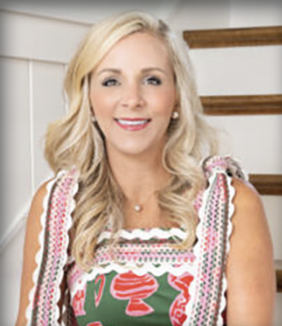 Lindsay Schulze, Realtor, Koehler Bortnick Team/ReeceNichols
Lindsay Schulze, Realtor, Koehler Bortnick Team/ReeceNichols
Depending on their level of ambition, Lindsay Schulze may have some difficult news for novice real-estate agents with visions of big dollars dancing in their heads. “I get the question, ‘How do I sell $60 million in my first year? How do I get to the top immediately?’ Schulze says. “I tell them, No. 1, you have to invest an insane amount of time. They ask about how I do personal hours, and I say I really don’t. I hashed out contracts during all three times in labor; I did it on my wedding day. We’re kind of 24/7, so if they say they want to show houses, I ask, “How bad do you want it?” For nearly 20 years, Schulze has wanted it. This Colorado native got into that after earning degrees in journalism and marketing from KU, then working for a Kansas City ad agency where the promotions arrived regularly—three in her first 11 months—but the pay raises never showed up. “I thought, this is for the birds,” Schulze said. “I loved all the marketing aspects of the clients I worked with. I loved thinking about how we ‘sell’ their item/brand/good, and that was really a passion of mine.” But it didn’t seem to make financial sense. Through a series of acquaintances, she connected with the Koehler-Bortnick team at ReeceNichols, then took real-estate classes at night while still working. “I could combine my passion for advertising/marketing with my passion for anything to do with houses,” Schulze says. “It was a beautiful connection. From that point, I went into not only buying houses, living in them, and selling them for a profit but also flipping houses on the side. I love the entire process, no matter how crazy it might have been. I love to see a worn-down house get a new look. It makes my heart happy!” To reach a leadership role, she says, “Think about what you are passionate about and start there. While you don’t have to be the smartest person, well at least not in my field, you need to work your tail off.” Even after the exhaustion of an 18-hour day, Schulze says, “I wouldn’t change it for the world. Think about something that you can put your whole heart into and really ‘invest’ in. Realty offers a path to personal success for women but at a cost. “This is a 24/7/365 job,” Schulze says, so if anyone tells her that’s too demanding, she encourages them to look elsewhere. “What I will tell them is if you are a hard worker and don’t want a job where you sit at a desk, this is for you. I would tell any person, man or woman, if you love being a mover and a shaker, solving problems, etc., then you will love this. I would tell any young woman that this job is about compassion, really bonding with your clients, and making them not only clients but lifetime friends. This industry gives you so many avenues to incorporate into one profession. We are not only Realtors but matchmakers, contractors, design experts, therapists sometimes, financial planners—it really is an all-encompassing profession.”
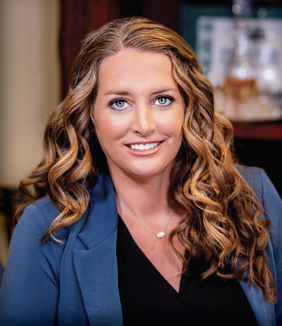 Sarah Tiedt, Vice President/Wealth Adviser, FCS Family Office
Sarah Tiedt, Vice President/Wealth Adviser, FCS Family Office
To understand what makes Sarah Tiedt an effective leader and wealth manager for FCS Family Office, one must look back to the playing fields of Johnson County, where she started in competitive softball as an eight-year-old, then to Baker University, where she played four more years while earning her degree in business management. “I played at a high level my whole life,” she says, often finding herself the selection to serve as team captain and giving her the opportunity to learn how to motivate those around her. “A lot of it came down to being positive, as opposed to beating down your teammates,” Tiedt says. “A hard loss is a hard loss, but it’s not helpful to make anyone feel bad about it. The style I developed was to be positive, continue to expect things of others, but not to beat them up.” Tiedt says her early impression of what work-life entailed came during summers spent at her father’s commercial insurance office, and it inspired her choice of business administration for studies at Baker. “Pioneer” might be too strong a word, but she was definitely out of step with her peers in that regard. “I had not really known any women who were in a business setting,” Tiedt recalls. “I don’t remember knowing too many who weren’t nurses, teachers, or stay-at-home moms.” After graduation, she held trust officer roles at Commerce and Blue Ridge banks before making an adjustment to wealth management, first with U.S. Bank, then Mariner Wealth Advisors, and, in 2020, FCS. The individual needs of clients, she says, yield a particular appeal. “I think all people are interesting and have a story,” Tiedt says. “The psychology of people and how they interact with family members and the world is so interesting, and sometimes, you can guide them in a way that allows them to feel fulfilled, make sure they feel secure and happy with their status and know that their family is taken care of. It takes a lot of work to get to know people at that level, and it helps to be endlessly curious.” She’ll admit that money was an early motivator to becoming a leader, but it yielded to a higher calling as she moved into team-building roles. “I wanted to help clients, but also help people I worked with to move forward,” Tied says. “I got some gratification out of that. I felt like, early on in my career, when I would ask questions and be curious, people wanted to share their experience and knowledge, so I wanted to make sure people coming up in the industry could get that from others.” She’s able to apply that through the firm’s twice-weekly meetings—they can run as little as 15 minutes—that reconnect on service standards, mission, and vision through themes like “I can continuously learn and grow” or “I own and immediately resolve client problems.” “Reiterating our goals and behaviors as a company,” Tiedt says, “keeps us all on track and focuses my leadership skills back to what is important: our brand promise and how it relates to our success and growth.”
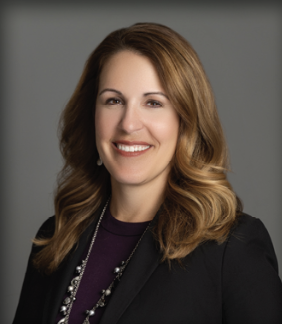 Samantha Werner, Sr. Vice President, Treasury Market Manager, Commerce Bank
Samantha Werner, Sr. Vice President, Treasury Market Manager, Commerce Bank
What to do when your best, in the view of your manager, always leaves room for improvement? Early in Samantha Werner’s banking career, working as a teller while in college, she ran into that exact situation. She could have been bitter. She chose otherwise. “That had me stretching myself for that top score and wanting to always do better,” she recalls. “Another manager, she said, had often counseled “that making mistakes wasn’t the end of the world, but she always encouraged her team to own up to the mistake and to come to the table with ideas of how to fix the issue.” Those are among the defining experiences that have helped her advance through the ranks at Commerce Bank, where she’s senior vice president and treasury market manager. Just as influential were her years growing up in Nixa, near Springfield, where she and her older sister “were raised to give 110 percent, to lead by example and to not ask anyone to do anything we wouldn’t do ourselves.” Childhood dreams of becoming an art teacher dissipated,” she says, “when I learned I’m not very artistic. Then I remember wanting to have a corporate job where I’d have a briefcase (crazy to think of now) and be seen as a leader. I wanted to make a difference.” She chose marketing as a major at Missouri State, with an emphasis on research. “I wanted to work for a marketing research company,” Werner says. “Bring on the briefcase.” But it wasn’t an easy field to enter. She went to work for a company that trained banks in creating electronic payment programs, a role that helped her overcome an innate fear of public speaking and one that paved the way for treasury product management. Just a year after joining Commerce, she was given leadership of the Kansas City treasury sales team and, in April 2023, was elevated to oversee teams in four of the bank’s western markets. That experience has taught her that those who aspire to leadership should “be willing to step outside of your comfort zone,” as with her own public-speaking experience. “Be open to trying new things and know it’s OK to deviate from the path in your head,” she says. “Ask questions and be a sponge as you interact with people along the way. This gives you different perspectives and helps to build not only your knowledge but also your network.” She wants young women in financial services to know that “you can have it all, the career and family life. As a mom of two teenage sons, I’ve been able to build my career along with being a mom and not missing out on the big moments. Find a mentor or mentors, within your preferred area of focus. Know it’s OK to switch mentors as your career progresses.” Finally, she counsels, “Find your champions inside and outside of work—this will assist you well on your path to leadership.”
 Uma Wilson, EVP/Chief Information & Product Officer, UMB Bank
Uma Wilson, EVP/Chief Information & Product Officer, UMB Bank
Good parents are good parents, Uma Wilson can tell you, wherever they call home. Hers was originally in India, where, she says, “Dad always told me you can be whatever you want to be. Mom said the same thing.” So young Uma followed her dream after wrapping up her degree in computer science from Madras University, came to the United States, and began a journey that would eventually lead to the world of banking, to Kansas City, and to the senior leadership at UMB, where she serves today as executive vice president and chief information and product officer. She arrived here with an understanding that success would come only with “consistent, hard work. Dad always taught me about being humble and hungry and how that would get you far in life. Even when I got good grades, he preached that I don’t have to brag: Be humble, always lean in, but at the same time, be hungry and work hard. That’s part of my DNA.” Computer science was a simple business decision: That’s where the jobs were. And from that stage, the choice of roles is varied. That, says Wilson, is being open to new possibilities. “It doesn’t matter where you go to college, the U.S. or India, when folks decide to do something, they still don’t know how their career path is going to shape up,” she says. “I never once thought I’d be on the banking side.” And yet, here she is, a fixture in the C-suite of the region’s biggest bank. She showed up there in 2005, about nine years roughly divided between Wells Fargo in California and Commerce Bank here. She had to learn banking from scratch and says that’s where being hungry paid off. Given the many roles available in banking, she says, “I’m a huge believer that you need to know the details. Ask anyone on my team. In order to be successful in the role as you transform into a leader, you need to know the details. As you elevate yourself in the company,” she says, “you have to be able to support your team and provide a vision of where you’re going, and that means knowing when to get into the details and when not to.” The path to leadership can diverge between concrete plans for advancement and simply mastering what you do while waiting for opportunities to emerge. Neither approach is inherently right or wrong, Wilson says, “but for me, I’m very driven, very ambitious. That doesn’t mean you should always be looking for the next job or role. But be good at what you know, and try to learn new skills. When people see those attributes, they will tap on your shoulder. And nothing is wrong with getting to know people, asking them to be mentors, and learning new skills. Your attitude and how you carry yourself is what gets you to your next position.”